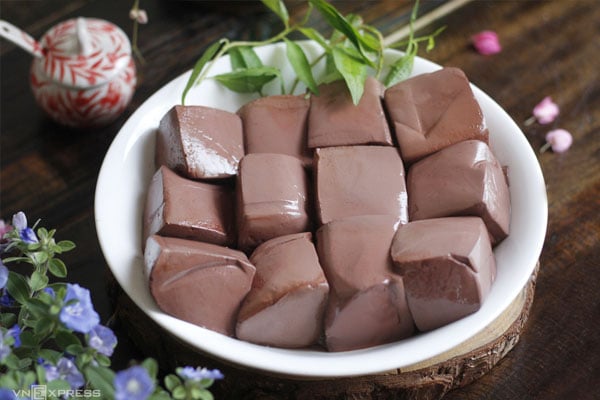6 Surprising Benefits of Boiled Pork Blood
+ Blood and Yin Tonification
Boiled pork blood has a cooling nature and a sweet taste, making it an excellent food for nourishing the blood. In traditional Chinese medicine, consuming boiled pork blood is believed to improve anemia, enhance blood circulation, and benefit those suffering from weakness, anemia, dizziness, and vertigo.

Pork Blood: A Delicious and Nutritious Delicacy
+ Heat Clearing and Detoxification
Pork blood has the ability to detoxify the body. It helps cleanse the intestines, eliminate toxins, and reduce internal heat. Boiled pork blood also aids in cleansing the digestive system, absorbing accumulated toxins, and facilitating their excretion from the body.
+ Cardiovascular Support
Research indicates that boiled pork blood is rich in iron, which helps combat anemia and promotes red blood cell production. Traditional Chinese medicine also suggests that it helps stabilize blood pressure and supports cardiovascular health.
+ Respiratory Function Improvement
According to traditional medicine, boiled pork blood can cleanse the lungs and improve respiratory function, reducing symptoms such as coughing, expectoration, and respiratory ailments.
+ Bone Health
Boiled pork blood contains significant levels of calcium, which contributes to bone health and prevents bone-related issues like osteoporosis. It is a natural source of calcium, especially beneficial for the elderly and those in need of extra bone nutrients.
+ Stress and Fatigue Relief
Pork blood is considered a restorative food that helps reduce stress, boost energy levels, and rejuvenate mental health for individuals experiencing fatigue and stress due to work or studies.
Precautions when Consuming Pork Blood

Ensure Freshness and Hygiene when Purchasing Pork Blood
When preparing this delicacy, it is crucial to select fresh and hygienic pork blood. Opt for bright red blood from freshly slaughtered pigs, and ensure the source is clean and reputable. Avoid purchasing pork blood from uncertain or unhygienic sources.
While pork blood offers nutritional benefits, excessive consumption is not recommended due to its high cholesterol content. Additionally, it tends to be high in salt as butchers often add it to prevent coagulation, which is not suitable for individuals with high blood pressure. Those with cardiovascular or hyperlipidemia risks should consume it in moderation.
Individuals with weak digestion or a tendency towards diarrhea should also exercise moderation as the cooling nature of pork blood may cause digestive issues or increase body coldness.
Lastly, refrain from using pork blood for making raw blood dishes. This delicacy is susceptible to bacterial contamination, which can lead to streptococcus suis infection and food poisoning from other bacteria, posing a direct threat to human health.






































